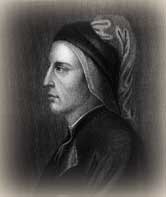
For Dante, political failure was costly. A "White" in the internal struggles of Florence, he became one of the city's six priors. Disturbances broke out with the "Blacks." The even-handed priors expelled the worst Blacks and Whites. The Pope, dependent on Black money, excommunicated the city unless it should restore the troublesome Blacks.
In November 1300, Dante, with others, traveled to Rome to plead with the Pope to lift the interdict. The Pope relented. He was, however, playing a double game. While negotiating with Florence he secretly invited Charles of Valois to bring an army to Italy. He sent Charles to Florence to make "peace." The Florentines, long friendly to the House of France, were reluctant to deny Charles entrance to their city, although they suspected him of duplicity.
Charles indeed proved to be a serpent. He betrayed the legitimate government, strengthened the Blacks and allowed them to enter the city. They immediately went on a five day rampage, looting, killing, and burning. They deposed the Whites and with them Dante. On this day, March 10, 1302 the victorious Blacks exiled him on pain of being burnt alive if he ever returned.
The banishment was deeply distressing to Dante. Emotionally it took him years to accept what had happened. He never saw his wife again, although some of his children visited him shortly before his death. In exile, Dante solaced himself with writing. One book defended the use of the Italian language over Latin. He produced a series of poems called Convivo (Banquet). In a treatise he argued for separation of church and state. Through letters he sought to influence Florentine politics. The collapse of his political hopes led him to stake his chance of restoration on one last, great work.
It is not known just when he began the Divine Comedy. A giant epic of love and faith, Dante envisioned it in three parts, Hell, Purgatory, and Paradise. It yearns with utopian nostalgia for a Pan-Christian empire and radiates a Boethian sense of divine reality. "...in His own eternity, outside of time, outside of every other limit, as it pleased Him, the Eternal Love disclosed Himself in new loves."
Banishment drew out Dante's genius. The Divine Comedy's vigorous style fixed the Italian language in its modern form well before the same was true of any other European tongue. He had been a poet, lover, father, ruler, soldier, and diplomat. Inevitably his work reflects this breadth of interests. Nonetheless, its merit escaped most contemporaries and did not win him a return to Florence. In fact, the church would place the Divine Comedy on the Index of Prohibited Books, probably because Dante had consigned seven wicked popes to hell.
Bibliography:
- Dante Alighieri. The Divine Comedy. Various editions.
- "Dante Alighieri." The Oxford Dictionary of the Christian Church. Edited by F. L. Cross and E. A. Livingstone. Oxford, 1997.
- Dante's Guide to Heaven and Hell. Christian History 70.
- D'Souza, Dinesh. The Catholic Classics. Huntington, Indiana: Our Sunday Visitor, 1986.
- Freccero, John. Dante; a collection of critical essays. Englewood Cliffs, N.J., Prentice-Hall, 1965.
- Gardner, Edmund G. "Dante Alighieri." The Catholic Encyclopedia. New York: Robert Appleton, 1914.
- Hawkes, Francis L, Editor. Pictorial Cyclopaedia of Biography. New York: Appleton, 1856.
- Sayers, Dorothy L. "Dante and Charles Williams." The Whimsical Christian. New York: Macmillan, 1978.
- Various encyclopedia and internet articles.